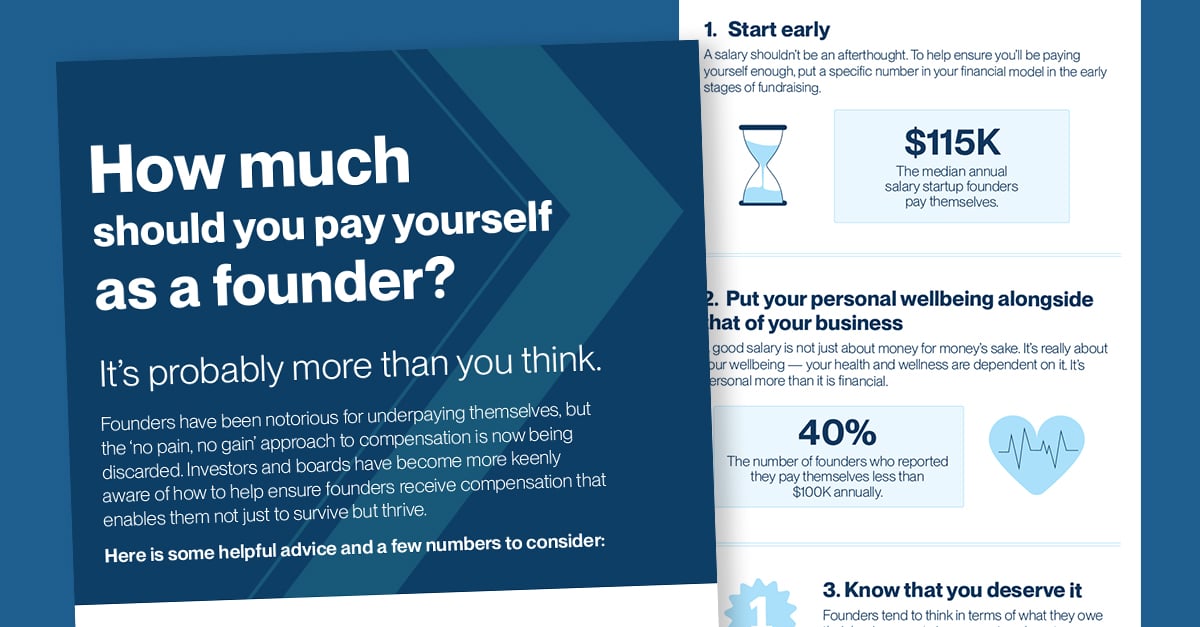We’re pleased to provide you with insights like these from Boston Private. Boston Private is now an SVB company. Together we’re well positioned to offer you the service, understanding, guidance and solutions to help you discover opportunities and build wealth – now and in the future.
Overcoming the obstacles faced by founders is never easy. As a female founder, there are often additional hurdles. Chief Investment Officer, SVB Private, Shannon Saccocia, and SVB Private Managing Director, Lorraine Monick, discuss the unique challenges facing female founders today.
Listen now.
For more on this topic.
Transcript
Shannon Saccocia: Hello and welcome to the perspectives podcast. I'm Shannon Saccocia, Chief Investment Officer, SVB Private Bank, and I want to thank you for listening in. This episode, I'm joined by Lorraine Monick, managing director at SVB Private Bank. We're going to discuss some of the challenges facing female founders today. Hi Lorraine, could you kick us off by telling us a little bit about your role at the Private Bank?
Lorraine Monick: Hi Shannon, thank you so much for the opportunity to join your show today. I joined SVB nearly nine years ago when we launched the wealth division. I have had more than 25 years of experience in wealth planning and investment strategy. At SVB Private Wealth Management, I focus on helping founders, venture investors, the C-Suite of innovation sector companies optimize their personal balance sheet to minimize risk, grow and protect their wealth for them, their families and future generations.
Shannon Saccocia: Thank you so much Lorraine. It sounds like you're the perfect person to join me today as we discussed the challenges faced by female founders. But before we talk about those challenges, I did want to go ahead and share a few facts from SVB’s Women in U.S. Technology Leadership Report which was based on feedback from almost 700 U.S. based startup executives who were surveyed just prior to the pandemic in late 2019.
The startup economy and the financial funding of this economy has been a focus for those studying gender inequity for decades, and there is an even greater emphasis on this topic as we come out of the worst points of the pandemic, as women have borne a greater burden of the disruption in our lives over the past two years.
A few things that I found particularly noteworthy: Although 42% of startups have at least one woman in a C-Suite position and 40% have at least one woman on the board, only 14% of U.S. startups have a female CEO. While admittedly that is a similar statistic to the Fortune 500, in which 15% of companies have a female CEO, given that 28% of startups have at least one female founder and CEO's often come from these founder ranks, it speaks to the hurdle of female founders to ascend to the CEO office.
And as we are a bank, what about funding? While 23% of total VC deal flow went to companies with a female founder in 2019, the total value of those deals was only 7% of the total value of all deals done that year. Part of that is likely attributable to upstream gender issues, as 65% of these C-firms have no female VC or general partners, and thus there is less representation in the room for these funding decisions.
With that said, the hurdles for female founders on the professional front, although improving modestly, remain high. Couple that with the cultural and social expectations placed on women and it is clear that female founders may have a set of nuanced needs. Lorraine, is this consistent with your experience in working with founders and have you seen any change in this trend over the last several years?
Lorraine Monick: Yes, Shannon, the data is consistent with what I observe in practice with respect to women founders. However, I believe the trend has improved over the last decade and we can expect to see it continue to do so now that these issues are the focus of many innovation sector participants, including Silicon Valley Bank. I'd add that underrepresented communities in the innovation ecosystem is broad and includes lots and lots of next communities in addition to women. SVB believes that expanding commitments and investments to all underrepresented communities creates a more diverse, equitable, inclusive innovation sector that will lead to better outcomes and innovations.
Shannon Saccocia: So that's a great point Lorraine because one of the things that we talk often about is how we can express our values in terms of our business. So, are there any specific things that SD is doing to bridge this gap in terms of partnering with either female founders or underrepresented founders that you just mentioned?
Lorraine Monick: Absolutely Shannon. First of all, core values recognize the importance of embracing diverse perspectives. One of our core values is we embrace diverse perspectives. Second, SVB has initiated comprehensive reporting to transparently share the industry's current state of the participation of women founders and investors as is noted in the Women in the U.S. Technology Leadership Report. Third, SVB is transparent with our own success of diversity inclusion and we also disclose our workforce gender and race and ethnicity data publicly on our website. We aim to be transparent, clear and a reporting aims to accommodate various country laws, including privacy. Fourth, SVB gives all of its employees opportunities to be involved in our many initiatives aimed at supporting women and founders and other underrepresented communities.
We are a founding partner and investor in the board list, which connects diverse executives with global board opportunities. We're a founding partner of All Raise, which has a goal of increasing VC funding for women founders to 25% of total VC investments in five years. As a final example, for the last 20 years SVB has been a partner in Ostia, which works to increase investment in women-led startups.
Shannon Saccocia: Thank you so much for sharing those facts, Lorraine. I can’t tell you having come in as part of the SVB Private acquisition last year. I'm so excited to see all of the great work that SVB is doing in this area.
But switching gears a bit, I know you have a wealth of experience working with individuals and families to achieve their goals. We know that women tend to face unique challenges in terms of balancing their professional and personal responsibilities. How do you partner with female founders to ease some of that pressure and tailor your advice knowing their challenges?
Lorraine Monick: It's interesting Shannon. In my experience working with female founders, it’s not significantly different than working with male founders. I believe that's because all of our founders tend to be competent, smart, and decisive. They're also all very busy. Time is a highly prized commodity. One of the ways that we can be successful is by matching them in their intensity and working smartly and efficiently. So, while it's true that women often are juggling many, many things, I think that because we're working uniquely in the cohort of very successful founders, these women are powerhouses. They know how to make decisions. They're very smart, they understand. Often, they understand math and statistics, and while they might not have a deep understanding of modern portfolio theory, they can very quickly grasp the principles of the wealth planning guidelines and strategies that we discuss with them.
Having said that, there are some differences in the way that we work with founders depending on where they are in their lifecycle. For example, young founders tend to take very low salaries when they're growing their companies, and it can be very hard for them to achieve a certain standard of living in cities like New York and San Francisco. In these instances, we help founders with cash flow planning, access to liquidity and the other areas that are important for them are some general wealth planning strategies that help them be prepared to minimize the impact of taxes, both income and estate planning taxes later on when their businesses grow and they achieve success.
It's interesting because often we'll work with some young founders who've been to a more traditional bank, and we'll hear feedback while the bank didn't understand my balance sheet and they weren't able to give me a mortgage because of my ownership and the private company. And often in situations like that, we do understand founders' balance sheets and can develop a solution that meets their needs.
When founders become more experienced and their companies have grown to be larger, they often take liquidity from their companies. And sometimes this can really be a pretty major wealth creation event, and along with that comes the responsibilities of managing more complex balance sheets. And then in these instances, as women founders have different needs than when they were younger, they are often again they need cash flow planning. They need to know how much is enough. They may have some charitable intent that will allow them to minimize the impact of the taxes that that resulted from the liquidity. They are often very concerned about raising responsible children. They're concerned with leaving a great deal of wealth to their children, and this is really where a holistic approach to wealth planning can be very valuable for these founders as they're navigating through these changes in their balance sheets.
Shannon Saccocia: There are certainly plenty of challenges as we move through the life cycle with the clients that we work with, but I think for both you and for me that's part of the fun. As we close, I'd love to hear your views on you know here in Women’s History Month, we just celebrated Black History Month last month, how can we here at SVB, continue to be ambassadors of change as we pursue a more diverse, inclusive environment here in the innovation economy?
Lorraine Monick: There's a couple of things Shannon. I think that first of all, when we meet a founder of an underrepresented group, let's ask what we can do to help them. We have an incredible powerful network of innovation sector experts. Most of us are programmed to help others achieve success in the innovation sector. One introduction, one brainstorming session can make a huge difference in the lives of a young or more experienced founder. Second, Silicon Valley Bank has a number of different programs that give us opportunities to be involved. We can sponsor an intern. We can mentor young professionals who volunteer at one of the organizations I mentioned earlier. And third, if you're in a position of hiring, then be inclusive. Ensure that you have diverse candidates who can fit in your pool.
Obviously, there's a balance between hiring the best candidate regardless of characteristics, but we've really need to be thinking about having diverse candidates in the pool. In closing Shannon, I'd just say that I'm actually incredibly delighted that Silicon Valley Bank has focused so much on diversity and inclusion and has given us many opportunities to get involved and really make the changes that will benefit the innovation sector as we proceed over the next decade.
Shannon Saccocia: Thank you so much Lorraine. I couldn't agree with you more and I think allowing access to opportunity is a critical piece and certainly something that SVB is in great position to do.
I want to thank Lorraine for joining me today and I want to thank you all for listening in. We'll keep digging into topics that impact your financial future. So, tweet me at Shannon Saccocia if there's something you'd like us to cover in a future podcast.
You can also read our latest perspectives on the market, the economy, wealth planning and where we go from here by visiting the link on this podcast page. Be sure to subscribe wherever you prefer to listen, so you don't miss an episode and I look forward to coming to you again very soon.














